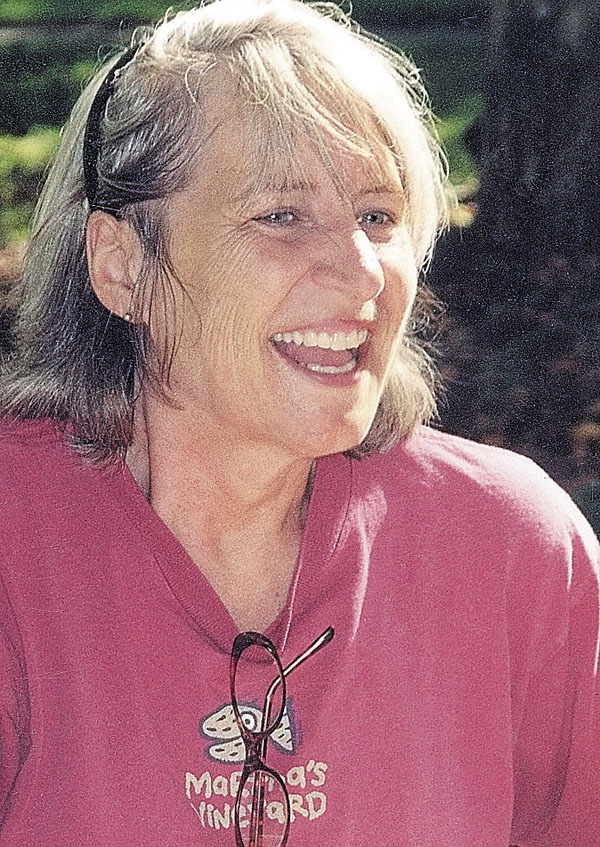WATERVILLE — How does someone work as an award-winning documentary film editor and live in central Maine?
The story of Mary Lampson is the answer. It’s a story of a young woman who broke barriers on the New York film scene and then chose to balance a scaled-back film career with raising a family in Dresden. Her editing work on films spanned the 1970s before she took a hiatus in the ’80s and ’90s, resuming film work again this last decade.
Now that her children are grown, it’s a story that finds Lampson, 65, again pursuing her passion for editing documentary films while settling two years ago in the Kennebec County town of Winthrop.
“There is sort of a gap, if you look at my resume, and during this period I was still productive, but that was by choice,” Lampson said. “I was always very clear I that I didn’t want to be torn between my work and the raising of my family. It was definitely by choice, and I always thought I’d go back in a serious way to my work. I always thought that life goes in 10-year cycles, but what I didn’t understand about children is it’s two, 10 years — 20 years.”
Lampson is touted as a “legendary editor” and “special guest” at this year’s Maine International Film Festival. Lampson and director Anne Makepeace will present their 2010 documentary film, “We Still Live Here (As Nutayunean),” about the cultural revival of the Wampanoag of southeastern Massachusetts. Showings are 6:15 p.m., Thursday, and 12:30 p.m., Sunday, both at Railroad Square Cinema.
Landing a career in film wasn’t easy for Lampson. After graduating from Sarah Lawrence College, she headed to New York City in the late 1960s in search of a job.
“I decided I wanted to get into film, but there weren’t many opportunities for women at that point, except in editing,” she said. “I went to New York totally with no training at all and just pounded the pavement for two months and pounded on doors.”
A high-end commercial-making company, Libra Productions, hired Lampson after sacking the least-senior employee. Her job was “print breakdown girl,” meaning she’d break down the film reels of commercials, put them in boxes and mail them to TV stations.
The most memorable commercial they produced? Noxzema shave cream, which became a sensation when the commercial’s model asked men to “take it off, take it all off.”
Lampson was able to go into the cutting room on her free time as an apprentice to an editor.
“Back then, that’s really how you learned,” she said. “I got very efficient at breaking down the commercials, and after an hour and half I’d be done and have rest of the day in the cutting room. A commercial house is a great place to learn because the whole process takes place in four to six weeks, as opposed to documentary feature that can take six, nine, 12 months to finish.”
After two and half months there, she was laid off. Which, in retrospect, “was probably a really good thing, because I’m not sure I would have been brave enough to quit.”
She began editing on her own while working with Emile de Antonio, a director and producer of documentary films that usually detailed political or social events. Lampson edited three of his films in the first half of 1970 — “Millhouse,” “Painters Painting” and “Underground.”
“I gained self-confidence; he was my mentor in a lot of ways,” Lampson said of de Antonio. “I was 23 when I started and very shy. I was always sort of naturally good at it, but I didn’t have a lot of confidence in myself.”
Then she edited “Harlan County U.S.A.,” a 1976 Oscar-winning documentary about a fight between coal miners and power companies in Harlan County, Ky., directed by Barbara Kopple. By this time, Lampson said, she had achieved comfort in her abilities as an editor.
De Antonio told Lampson that she should be making her own films. So she directed her first, “American Playhouse,” in 1979, while leaving New York City and moving to Maine, where she had often come for family vacations.
At her new home she edited the TV movie “Until She Talks,” which was released in 1981around the same time Lampson gave birth to her first child.
That’s when she made a choice.
“I didn’t want to work full time. It’s one of reasons why I wanted to leave New York,” she said. “And I was very clear that I didn’t want to be within commuting distance of New York, because I would just end up spending my time in the city.”
Still, Lampson did not leave behind film editing entirely. She continued to work on projects, including short documentaries airing with the popular children’s show “Sesame Street.” During her move from New York to Dresden, she continued editing documentaries that explored comparisons between the city and country, “so it was something that translated really well to Maine.”
She also did film residencies, working with children and artists, and as a producer-director for the University of Maine.
“I always kept my creative juices percolating along. I never felt I had lost that part of myself,” she said. “And I was always pretty confident of myself, in my abilities, when I left New York.”
After she divorced and her two children had grown and moved out, Lampson knew she wanted to focus again on editing documentary films. And she could do that by drawing on her experience and films connections, while still living in Maine.
She was particularly drawn back because of the dramatic changes in technology and style that the form had undergone the last 20 years, making it an “exciting time to be making documentaries.” She mulled whether to pursue editing or directing jobs, but ultimately settled again on editing because she enjoys the collaborative aspects of film-making.
“I can be pretty picky; it’s very important to me that I really believe in what the film is about and that I respect and can collaborate with whoever the director or directors are,” Lampson said. “I think I’m very intuitive, quite good at quickly picking up what the movie is about at some deeper level, but I’m also somewhat analytical, which an editor has to be both those things. Because, really, it’s all about the structure. I’m very good at knowing a story.”
Scott Monroe — 861-9239
smonroe@centralmaine.com
Copy the Story LinkSend questions/comments to the editors.




Success. Please wait for the page to reload. If the page does not reload within 5 seconds, please refresh the page.
Enter your email and password to access comments.
Hi, to comment on stories you must . This profile is in addition to your subscription and website login.
Already have a commenting profile? .
Invalid username/password.
Please check your email to confirm and complete your registration.
Only subscribers are eligible to post comments. Please subscribe or login first for digital access. Here’s why.
Use the form below to reset your password. When you've submitted your account email, we will send an email with a reset code.